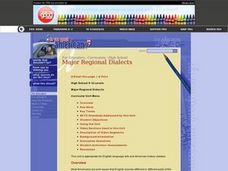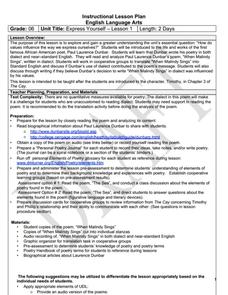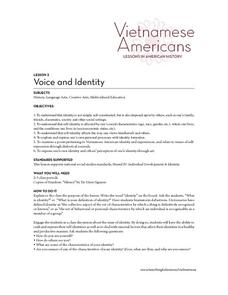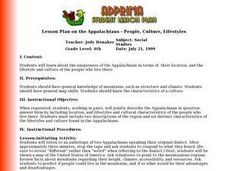Curated OER
Major Regional Dialects
What does your dialect sound like? Examine variation in English as it relates to geographic regions with your class. They recognize some of the major differences between regional dialects and determine that everyone speaks a dialect....
National Endowment for the Humanities
Mark Twain and American Humor
“The Celebrated Jumping Frog of Calaveras County” is famous, in part, because it established a uniquely American form of humor. For this famous story, Mark Twain combines the tall-tale, the dialect story, and satire. Here is a resource...
Curated OER
Weather and Dialect
What's the difference between an accent and a dialect? Examine the difference between the two with your scholars. In groups, they compile a dialect dictionary. They interview adults to gather information about accents and ethnic words....
Curated OER
The Stranger Redeemed: A Portrait of a Black Poet
Read and analyze poems by African-American authors. Using the text, they identify the various patterns, subjects, language and dialects used. Then team up to compare and contrast the various authors and define new vocabulary. The lesson...
Curated OER
6th Grade: Express Yourself, Lesson 1: Poem
While originally created to accompany The Cay, this poetry lesson could be used on it's own, especially if you are working on dialect. Class members conduct a close reading of "When Malindy Sings" by Paul Laurence Dunbar and listen to an...
Curated OER
Traditions and Languages of Three Native Cultures: Tlingit, Lakota, and Cherokee
Students explore the connections between tradition and language. They examine the environment, history and culture of the Tlingit, Lakota and Cherokee tribes and identify the importance of maintaining languages for oral traditions.
Curated OER
Native Lands: Indians in Georgia
Students investigate the Native Americans of the Muscogee Creek and their use of the land. In this U.S. history lesson, students investigate the importance of the deer for the Muscogee Creek peoples' way of life and the many uses they...
Teaching Tolerance
Vietnamese Americans: Voice and Identity
Learners explore the concept that one's identity is imposed by others, such as one's family, friends, classmates, society, age, race, gender and socioeconomic status. They assess a poem pertaining to Vietnamese American identity and...
Curated OER
Poet James Whitcomb Riley: Famous in His Own Day
An engaging biography of "Hoosier" poet James Whitcomb Riley serves as a springboard for study of his unique dialect-based verse. Several activities illuminate differences between spoken vernacular and formal language. Learners record...
Curated OER
The Harlem Renaissance Births a Black Culture
Students examine the men and women who were a part of the Harlem Renaissance. Individually, they recreate their favorite pieces of art from the time period and create their own original works after reading poem from the movement. In...
Curated OER
Word Play
Learners examine the history of Chinese American artist Xu Bing. In this multicultural lesson, students collaborate in small groups to identify letters in the artist's work, and brainstorm how they would create their own images from...
Curated OER
Her stories: African American folktales, fairy tales, and true tales
Students discuss the illustration's allusion to the myth, Pandora's Box. Students locate instances of folk sayings or expressions that make these tales seem authentic to the reader. Students draw a Venn diagram comparing Catskinella and...
Curated OER
Exploring Race Through Literature
Provide your class with an opportunity to examine race through a variety of literary works. They read and analyze a chosen poem, interview, speech, or story describing race in America. They then use key words from the original work to...
Curated OER
Communicative Choices & Linguistic Style
Start by watching a video entitled Do You Speak American? and respond to discussion questions about the various dialects showcased throughout the video to identify the regional linguistic styles throughout America. As a culminating...
PBS
Their Eyes Were Watching God: The Impact of Language
Author, filmmaker, and anthropologist Zora Neale Hurston was also a dialectologist. The dialogue of the characters in her novel Their Eyes Were Watching God reveals her fascination with accents and dialects. A short video from the Great...
Curated OER
Lesson Plan on the Appalachians - People, Culture, Lifestyles
Fourth graders examine and discuss the location, lifestyle, and culture of the people of the Appalachians. They listen to a tape of an Appalachian dialect, the story, When I Was Young in the Mountains, and write and conduct questions for...
Curated OER
Ceremony
Students complete multiple lessons to identify the human rights and social justice for Native Americans. In this human rights lesson, students complete fifty one days of activities to a lesson titled "Ceremony" about the Native...
Curated OER
Dialect Poems of Paul Laurence Dunbar
Students examine the life and works of Paul Laurance Dunbar. In groups, they read various poems of his and use a database to examine the covers of his books. They also discuss the criticism he faced during his life and how he dealt...
Curated OER
Spanish & Chicano English
Students examine the history of Spanish in what is now the United States. They examine the current language status of the Hispanic population. Students are able to characterize Spanglish and Chicano English. They examine some features...
Curated OER
Utah Indian - Future Changes
Fourth graders discuss and share ideas on how they think the Utah Indian tribes change in the future.
National Endowment for the Humanities
Nathaniel Hawthorne and Literary Humor
Young scholars examine Nathaniel Hawthorne's style of humor and compare it to other humorists. They discuss the purpose of literary humor and determine how it develops characters and plots in stories. They analyze the use of different...
Curated OER
Perspectives on Written & Spoken English
Students explore issues surrounding language norms, including the distinction between prescriptive and descriptive norms, the differences between norms for spoken English and those for written English, how word meanings change, and...
Curated OER
Metis- Grade 11
Eleventh graders consider the impact of immigration on native peoples. In this Canadian history lesson, 11th graders watch "Places Not Our Own," and then participate in a classroom simulation that requires them to consider land...
Curated OER
Solving a Community Problem Through Education
Fourth graders examine and compare Indian and American culture in order to develop a better understanding of both.























